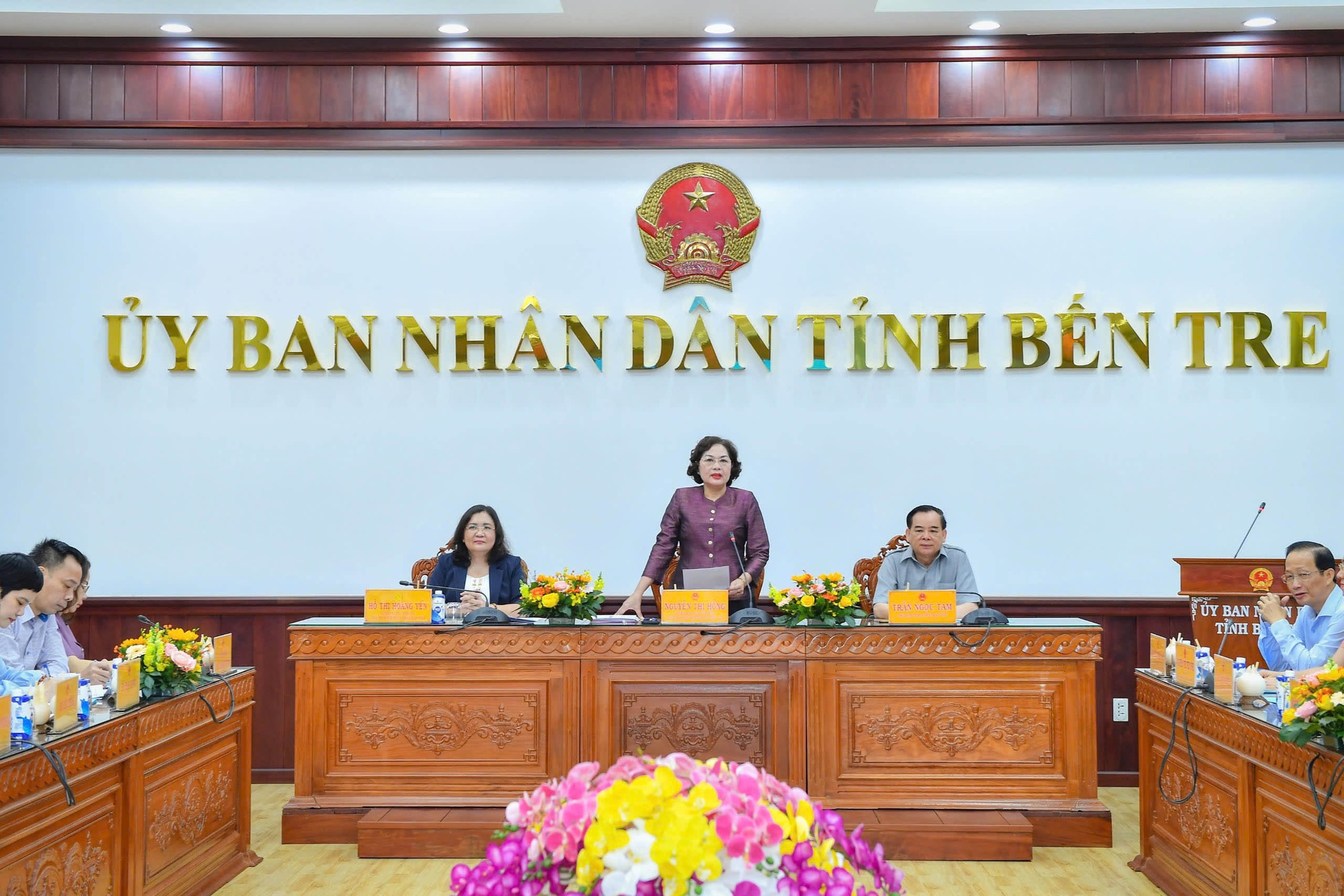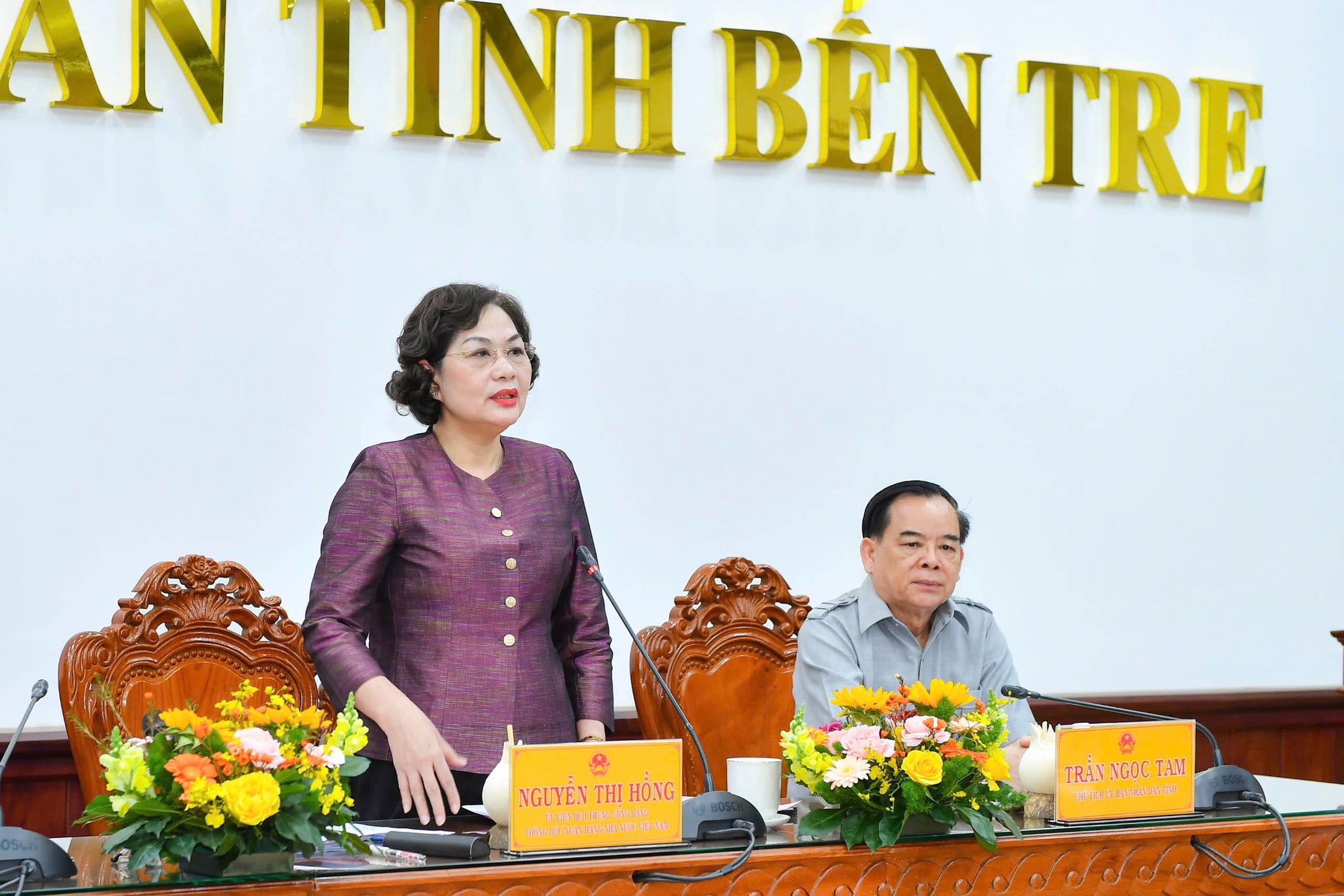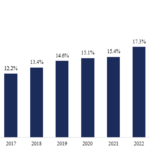At the meeting, Mr. Nguyen Truc Son, Vice Chairman of the People’s Committee of Ben Tre province, reported on the business results, stating that by the end of 2024, Ben Tre province achieved a gross regional domestic product (GRDP) growth rate of 5.68%. Agricultural and fisheries production remained stable, with no dangerous epidemics occurring in livestock and poultry. The industrial and small-scale industry production value increased by 7.93%, while the total retail sales of goods and service consumption services rose by 11.58%.

The provincial People’s Committee, People’s Council, and Provincial Party Committee work with the Working Group. Photo: Thach Binh
Breakthrough solutions for economic growth
In 2025, the province of Ben Tre was assigned by the Government a target economic growth rate of 8% – a challenging goal for the locality’s development. Therefore, since the beginning of the year, the People’s Committee has simultaneously implemented numerous breakthrough solutions across all sectors of the economy.
Specifically, in the field of agriculture, forestry, and fisheries, Ben Tre will focus on expanding the area, increasing the output and value of agricultural and aquatic products. This includes developing an additional 700 hectares of organic coconut gardens integrated with a model of shrimp (green-legged shrimp) farming in coconut gardens; investing in an additional 100 hectares of high-tech sea shrimp farming…
In the field of industry and construction, the locality will strive to complete key projects such as Phu Thuan Industrial Park; accelerating the progress of connecting to the national grid for the two wind power projects, Sunpro and Thanh Hai 2 – 3 – 4.
Regarding the service sector, Ben Tre will promote the exploitation and development of the domestic trade market; implementing consumption stimulus programs; encouraging the injection of capital into production and business to achieve double-digit credit growth; and boosting logistics and transportation services…
In terms of public investment, as of the end of 2024, Ben Tre had disbursed VND 4,578.6 billion of public investment capital, reaching 88.5% of the plan. Last year, the province actively invested in key projects such as Rach Mieu 2 Bridge Project; Ba Lai 8 Bridge Project; Phu Thuan Industrial Park Project; North Ben Tre Irrigation System Project; and Essential Infrastructure Project to support the development of fruit tree and ornamental plant areas in Mo Cay Bac district and Cho Lach district…
Regarding exports, last year’s export turnover of the province reached approximately USD 1.63 billion, up 12.23% over the previous year. As of the end of February 2025, the province’s export turnover reached more than USD 300 million, a strong increase of 40.3% over the same period last year.
Regarding the National Target Programs, up to now, Ben Tre has successfully built 113 new-style rural communes. The total capital of the National Target Program for New Rural Development in the province has disbursed about VND 214.9 billion. Ben Tre disbursed about VND 68.6 billion from the National Target Program for Sustainable Poverty Reduction in 2024 to implement hunger eradication, poverty reduction, and social security development activities.
Banks support the formation of large enterprises, leading local industries
At the meeting, Ms. Ho Thi Hoang Yen, Acting Secretary of the Provincial Party Committee and Chairwoman of the Provincial People’s Council of Ben Tre province, stated that to achieve the target of 8% GRDP growth in 2025, Ben Tre needs to continue promoting the comprehensive development of all sectors of the economy, especially in areas where the locality has strengths and key projects and programs at the provincial and regional levels.
Ms. Yen emphasized the important role of credit capital from the banking system in supporting the locality in building large-scale enterprise models that can lead local industries with strengths.
According to Ms. Yen, in the future, if commercial banks focus on providing capital support and removing difficulties for projects in the field of export processing, infrastructure projects, social housing, and the construction of transmission lines for wind and solar power projects, it will significantly contribute to Ben Tre’s completion of its economic growth targets for 2025.

Governor of the State Bank of Vietnam, Nguyen Thi Hong, directs at the working session in Ben Tre in March 2025 – Photo: Duc Khanh
At the working session in Ben Tre, Ms. Nguyen Thi Hong, Governor of the State Bank of Vietnam and Head of the Government’s Working Group, requested the People’s Committee of Ben Tre province and the departments and branches in the province to continue promoting the positive results achieved in the past year, striving to complete the socio-economic development targets for 2025 according to the Government’s targets and directions.
Based on the results of the first two months of 2025, Governor Nguyen Thi Hong assessed that Ben Tre’s socio-economic situation has had many positive changes. It is expected that Ben Tre’s GRDP in the first quarter of 2025 will grow by 6.28% over the same period. “This is a high growth rate, which will create a foundation and momentum for the province to achieve its full-year targets,” the Governor emphasized.
The Governor also requested the representatives of the ministries and branches of the Government’s Working Group to acknowledge the direct proposals from the locality and provide solutions and suggestions to the province in speeding up site clearance for large projects and works, promoting public investment disbursement, and implementing the Government’s preferential and support programs for each economic sector.
In addition, coordination is needed to address difficulties related to the sustainable development of agricultural and aquatic raw material areas and the construction of commodity value chain linkage models, large-scale agricultural production, as well as green economic projects to respond to saltwater intrusion and climate change.
Regarding the banking sector, the Governor of the State Bank directed the State Bank branch in Region 13 and credit institutions in the area to continue implementing the directions of the Central Bank well. The Governor requested the units to proactively coordinate with related departments and branches to evaluate the production and business situation of the people and enterprises; grasp the difficulties and obstacles to promptly remove credit relations; and strengthen the connection between banks and enterprises.
Actively advise the Party committees and local authorities on credit policies to serve socio-economic development in the area, in the spirit of closely following the resolutions and plans for socio-economic development of the province, thereby contributing to promoting local economic growth.
Credit focuses on Ben Tre’s strong sectors
According to the report of the Credit Department for Economic Sectors (SBV), Ben Tre province currently has 109 transaction points of credit institutions, including 20 branches of level 1; 8 People’s Credit Funds; and 1 microfinance institution.
As of the end of February 2025, the total mobilized capital of credit institutions in the area reached VND 63,600 billion, up 2% compared to the end of 2024. The total outstanding credit balance in the province reached VND 68,100 billion, of which credit in the field of agriculture, forestry, and fisheries reached about VND 20,500 billion; industry and construction sector about VND 12,300 billion; and the trade and service sector about VND 34,500 billion.
The key sectors of Ben Tre province that received credit institutions’ focus on lending include: seafood (outstanding debt of nearly VND 7,800 billion); rice (outstanding debt of VND 1,100 billion). As of January 2025, the outstanding debt for coconut lending reached nearly VND 4,100 billion, of which lending for purchasing and processing accounted for 51%, exports accounted for 44%, and the rest was for coconut planting and care.
Prime Minister: Finalize Inspection Conclusion for Bach Mai, Viet Duc Hospital Branch 2 by March
Prime Minister Pham Minh Chinh has instructed the Government Inspectorate to complete an inspection report on the investment projects for the construction of the second campuses of Bach Mai Hospital and the Vietnam-Germany Friendship Hospital in the northern province of Ha Nam prior to March 31.
Accelerating Growth: Navigating the Pitfalls and Paving a Smooth Path to Success
Rapid economic growth is pivotal for Vietnam to escape the middle-income trap, bridge the gap with advanced economies, and aspire to become a high-income nation in the next two decades. This is a legitimate aspiration. However, alongside the goal of rapid growth, we must be vigilant and proactive in addressing the potential drawbacks that this process may entail.
Unleashing the Private Sector: Removing the Brakes for a True Economic Breakthrough
In the context of Vietnam’s intensified reform and international integration, the private sector is increasingly asserting its pivotal role in the economy. However, to truly unleash its potential, a comprehensive strategy is needed to address the existing constraints. In an interview with the Government Online Newspaper, Professor Vu Minh Khuong, a lecturer at the Lee Kuan Yew School of Public Policy (National University of Singapore), shared his insights on the obstacles, opportunities, and directions to enable the private sector to become a driving force for the country’s development.
The Debt Burden’s Drag on Economic Growth
Debt is a pivotal tool in the modern financial system, stimulating consumption and investment while contributing to economic growth. When managed prudently, credit enables businesses to expand their production, enhance operational efficiency, and improve labor income, thereby creating a positive ripple effect on the economy. However, debt growth is not a panacea for perpetual expansion, as the burden of interest payments can become onerous.
The Prime Minister: Proactive and Agile in the Face of Global Economic Flux
As economic and trade policies evolve globally, the Prime Minister has urged for a proactive and agile approach. We must closely monitor these dynamic policy changes and respond with flexibility and feasibility for each market. To thrive in this evolving landscape, we should focus on fostering stronger partnerships with key players, reviewing tax policies, and strategically investing in high-tech sectors and innovation.




















